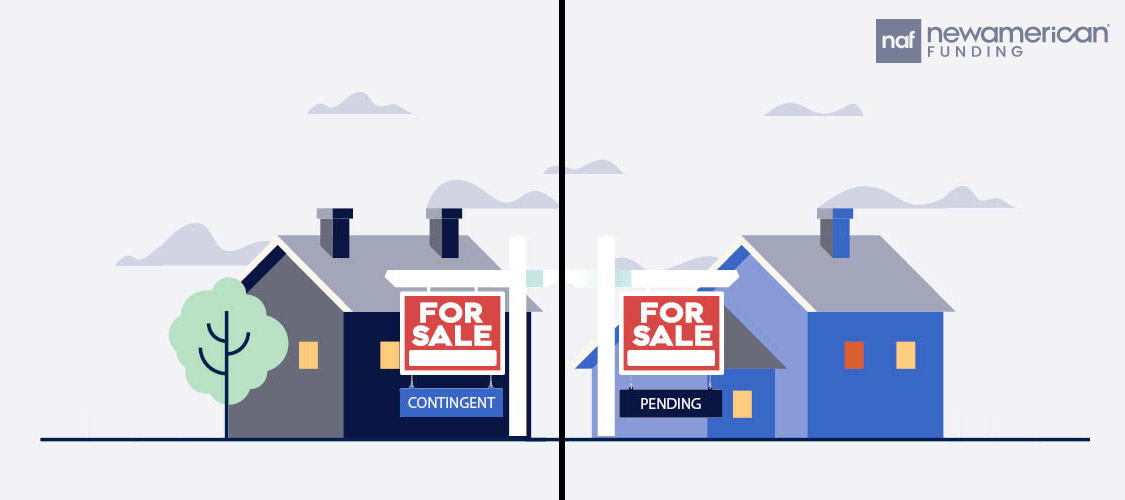Homebuyers
Contingent vs. Pending
May 17, 2024
Have you been left confused by contingent vs. pending after seeing these descriptions in property listings during your search for a new home? You're not the first person to wonder how these terms can affect a home sale. What is pending vs. contingent?
Contingent means that a seller has accepted an offer on the condition that specific contingencies are satisfied by closing day. Pending means that all provisions have been successfully met while a sale is being processed. While neither can be considered a "done deal" until the closing papers are signed, pending is more of a done deal compared to contingent. Let's explore why the difference between contingent vs pending sales is important!
Real Estate Contingencies Explained
Real estate contingencies are essential conditions that need to be met for a contract to become legally binding. Contingency clauses protect buyers and sellers by giving them the right to cancel a contract if the specified terms aren't met. While there are many reasons to consider contingencies when buying a home, the two most common contingencies in real estate are the inspection contingency and financing contingency.
An inspection contingency states that a buyer has a right to have a home inspected. If specific issues are found, the buyer can either back out or request that the seller fix the problems without risking the loss of their earnest money. Financing or "new home" contingencies allow the buyer to delay closing until they can sell a current home or get a loan. There's even a seller version of this that allows the seller to cancel the deal if they are unable to find another home they would like to buy within a specified time frame.
What Does Contingent Mean in Real Estate?
If you see a contingent listing, it means that the seller is waiting for contingencies to be met even though they have accepted an offer. A contingent offer comes with specific stipulations. A home can be contingent with or without a kick-out clause. With this clause, a specific deadline has been set for fulfilling all contingencies. Without it, the seller and buyer can take their time to meet all contingencies listed in the offer to buy.
Sellers often leave contingent homes listed just in case an offer falls through. Many will even take backup offers after accepting a contingent offer to be able to quickly accept the next offer. If a property is still being shown while contingent, this is what's known as a continue-to-show (CCS) property.

What Does Pending Mean in Real Estate?
Pending means that a sale is currently being processed. The sale either never had contingencies or had all previous contingencies met. Ideally, any property that is listed as contingent will eventually pivot to a pending status once all conditions have been met. The buyer and seller can safely assume that a transaction is going to go through when a home is listed as pending. Generally, the buyer will simply be moving through the process of performing due diligence leading up to closing. However, it's never a "sure thing" until closing has taken place. This is why some sellers choose to list their pending status as "taking backups."
Contingent vs. Pending: Key Differences
When it comes to contingent vs pending, the key difference is that a contingent offer is still waiting for outstanding requirements to be fulfilled before it can switch to pending status. In both cases, sellers can continue accepting backup offers. Common contingencies don't generally disrupt the sale process. However, they can make the closing period longer. For example, a buyer asking for 30 days to find a buyer for their current home could stretch out the closing process by several weeks. There may also be more time spent on back-and-forth negotiations between the buyer's agent and the seller's agent.
Both contingent and pending offers limit a buyer's ability to continue searching for properties. While they can certainly continue to browse, buyers should not submit new offers for homes unless a current contract has fallen through. Legally speaking, making an offer on a home after an offer has already been accepted could lock a buyer into a situation where they can lose earnest money or be legally required to purchase two homes.
How to Handle Contingent Offers as a Seller
A seller's approach to contingent offers can vary based on current market conditions. In a market where lots of offers are coming in, sellers may decide not to entertain contingent offers. However, some sellers will look at contingent offers if they are above the asking price. A big-picture approach is also helpful. For example, a contingent buyer with strong financing may be a more attractive candidate compared to a non-contingent buyer with weaker financing.
To reduce the risk of a failed sale, sellers need to be firm in their negotiations. Setting a deadline for when a contingency needs to be met can help a seller avoid losing time while other offers could be entertained.
How to Approach Pending Sales as a Buyer
Keeping your expectations realistic is the best way to handle a home with the pending status that has caught your eye. While only a small percentage of pending sales fail, there is still a chance that the home will be back on the market while you're still shopping. Let your real estate agent know if there's a pending property you'd like to pursue. If the seller is accepting backup offers, submitting your offer with an escalation clause that automatically offers a certain amount above the highest offer can be a strategy for making your offer attractive to the seller. If the home isn't accepting backups, you can continually check the MLS to see if it gets relisted.
Real Estate Agent's Role
The role of a real estate agent during contingent and pending status is to protect the interests of their client while also upholding the legal contract between buyer and seller. Agents assist buyers and sellers by communicating their options to them, speaking with the other side's agent on their behalf, and helping them to meet all deadlines necessary to avoid being in breach of contract. Buyers and sellers need to speak frankly and continuously with their agents to confirm that everything is moving along as planned.
Potential Buyer's Perspective
For buyers, contingent and pending listings should be viewed as properties that are "spoken for." However, buyers in hot markets should consider making offers on these homes if they'd like to be considered if offers fall through. It's important to take an offer that's being made on a contingent or pending home just as seriously as one made on an active listing because there is a possibility that your offer will be accepted. Some strategies for making offers on properties with contingent or pending status include:
- Adding escalation clauses to offers.
- Making an offer above the asking price.
- Leaving contingencies out of your offer.
- Put down a large down payment.
The benefit to pursuing contingent or pending properties is that your offer may be the next in line if the initial offer falls through. The downside is that you may end up devoting time and emotional energy to properties that will never be available to you.
FAQs About Contingent and Pending Sales
Can a contingent property become available again?
Yes, contingent properties do sometimes come back on the market if a deal falls through. The fact that a contingent deal fell through is not necessarily an indicator that something bad was discovered during a home inspection. The buyer may have simply been unable to obtain financing.
What are my options if I'm interested in a pending property?
Ask your agent if the seller is currently accepting backup offers. Some sellers will continue to show their homes after accepting an offer just in case the deal falls through.
How long do contingent and pending statuses usually last?
In general, a home will remain contingent for 30 to 60 days. Pending offers can also remain for between 30 and 60 days. Currently, the average time to close a house is 42 days.







 Smart Moves Start Here.
Smart Moves Start Here.